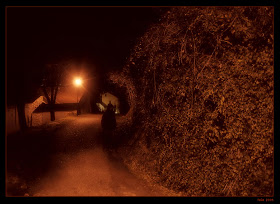 Despite its pervasive nature, there has been a lack of etiological research on the subject. The fear of darkness (nyctophobia) is a psychologically-impacted feeling of being disposed from comfort to a fear-evoking state. The fear of darkness or night has several non-clinical terminologies--lygophobia, scotophobia and achluophobia. Nyctophobia is a phobia generally related to children but, according to J. Adrian Williams’ article titled, Indirect Hypnotic Therapy of Nyctophobia: A Case Report, many clinics with pediatric patients have a great chance of having adults who have nyctophobia. The same article states that “the phobia has been known to be extremely disruptive to adult patients and… incapacitating”
Despite its pervasive nature, there has been a lack of etiological research on the subject. The fear of darkness (nyctophobia) is a psychologically-impacted feeling of being disposed from comfort to a fear-evoking state. The fear of darkness or night has several non-clinical terminologies--lygophobia, scotophobia and achluophobia. Nyctophobia is a phobia generally related to children but, according to J. Adrian Williams’ article titled, Indirect Hypnotic Therapy of Nyctophobia: A Case Report, many clinics with pediatric patients have a great chance of having adults who have nyctophobia. The same article states that “the phobia has been known to be extremely disruptive to adult patients and… incapacitating”
Nyctophobia is a fear suffered by both adults and children. It is most common among pediatric patients. Nyctophobic patients are frightened by thoughts of darkness. They assume a quicker response to darkness than do most people. For most adult patients, the fear has been with them since childhood. Adults who developed the phobia in childhood may suffer from any retrospective reference or mental-recall of past events in the dark. The lack of analytical and interpretive studies on nyctophobia allows only a limited understanding of the phobia. There is little known information about the pathological background and emotional aspects of nyctophobia. Television shows and movies are two of the known factors that cause children to develop a fear of darkness. Telling scary stories, especially while in the dark, is one other factor that may cause kids to develop the phobia.
There are several different reactions observed in people who have nyctophobia. James G. Hollandsworth’s Physiology and Behaviour Therapy states that for a person to be diagnosed with a phobia they must have 4-12 symptoms. The different possible conventional symptoms many of the phobias have in correlation include “dyspnea (“air hunger”), palpitation (rapid beating of the heart), chest pain or discomfort, choking or smothering sensations, dizziness or vertigo, feelings of unreality, paresthesia (tingling in the hands and feet), hot or cold flashes, sweating, faintness, trembling or shaking, and a fear of dying, going crazy, or doing something uncontrollable.”
These few symptoms all categorically fall in as either a physical, emotional, and/or mental reactions. Those who suffer from nyctophobia generally experience fast heart-beating, sweating, hard time breathing and overwhelming fright. The extremity of the symptoms depends on how severe the subject’s case of nyctophobia is. Nyctophobia, like many other phobias, causes a mental derangement leading to one’s inability to cope with things during night times. Anticipation of darkness for nyctophobic patients may affect their entire day. Depression is a possible side-effect for someone with nyctophobia. There have been few tests and experimentations; although, the few credible experiments have put some light on what nyctophobia really is. Nyctophobia is a dangerous disease.... Wikipedia
Welcome to "A Light In The Darkness" - a realm that explores the mysterious and the occult; the paranormal and the supernatural; the unexplained and the controversial; and, not forgetting, of course, the conspiracy theories; including Artificial Intelligence; Chemtrails and Geo-engineering; 5G and EMR Hazards; The Net Zero lie ; Trans-Humanism and Trans-Genderism; The Covid-19 and mRNA vaccine issues; The Ukraine Deception, Flat Earth, Tartaria ... and a whole lot more.
Further Reading
▼
Saturday, 23 May 2009
Nyctophobia
Nyctophobia is a limiting and disabling disease characterized by a frenzied fear of the darkness. It is triggered by the mind’s disfigured perceptivity of what would or could happen when in a dark environment.